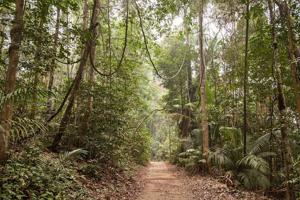
News
September 13, 2025
Protecting Amazon Forests May Also Protect Human Health, Study Finds
Key Takeaways
Protecting the Amazon rainforest isn't just about saving trees and wildlife; a new study suggests it's also crucial for safeguarding human health. The research highlights a direct link between deforestation and the increased spread of diseases in nearby communities.
The study emphasizes that as the Amazon rainforest shrinks due to logging, agriculture, and mining, the delicate balance of the ecosystem is disrupted. This disruption forces animals, some of which carry diseases, to move closer to human settlements in search of food and shelter. This increased proximity creates more opportunities for diseases to jump from animals to humans, a phenomenon known as zoonotic spillover.
Researchers found that areas with significant deforestation experienced a noticeable rise in cases of malaria, dengue fever, and other vector-borne illnesses. These diseases are spread by insects like mosquitoes, which thrive in disturbed environments created by deforestation. The clearing of forests creates stagnant water pools, ideal breeding grounds for these disease-carrying insects.
Furthermore, deforestation can alter local climate patterns, creating warmer and more humid conditions that further favor the proliferation of mosquitoes and the spread of diseases. The loss of tree cover also reduces shade and increases soil erosion, impacting water quality and potentially leading to waterborne diseases.
The study underscores the importance of sustainable land management practices and conservation efforts in the Amazon. Protecting the forest not only preserves biodiversity and combats climate change but also acts as a vital public health measure. By maintaining the integrity of the Amazon ecosystem, we can reduce the risk of disease outbreaks and protect the health and well-being of communities living in and around the rainforest. The findings serve as a powerful reminder that environmental health and human health are inextricably linked, and that investing in forest conservation is an investment in a healthier future for all. Therefore, effective policies aimed at curbing deforestation and promoting sustainable development are critical for safeguarding both the environment and the health of populations reliant on the Amazon rainforest.
The study emphasizes that as the Amazon rainforest shrinks due to logging, agriculture, and mining, the delicate balance of the ecosystem is disrupted. This disruption forces animals, some of which carry diseases, to move closer to human settlements in search of food and shelter. This increased proximity creates more opportunities for diseases to jump from animals to humans, a phenomenon known as zoonotic spillover.
Researchers found that areas with significant deforestation experienced a noticeable rise in cases of malaria, dengue fever, and other vector-borne illnesses. These diseases are spread by insects like mosquitoes, which thrive in disturbed environments created by deforestation. The clearing of forests creates stagnant water pools, ideal breeding grounds for these disease-carrying insects.
Furthermore, deforestation can alter local climate patterns, creating warmer and more humid conditions that further favor the proliferation of mosquitoes and the spread of diseases. The loss of tree cover also reduces shade and increases soil erosion, impacting water quality and potentially leading to waterborne diseases.
The study underscores the importance of sustainable land management practices and conservation efforts in the Amazon. Protecting the forest not only preserves biodiversity and combats climate change but also acts as a vital public health measure. By maintaining the integrity of the Amazon ecosystem, we can reduce the risk of disease outbreaks and protect the health and well-being of communities living in and around the rainforest. The findings serve as a powerful reminder that environmental health and human health are inextricably linked, and that investing in forest conservation is an investment in a healthier future for all. Therefore, effective policies aimed at curbing deforestation and promoting sustainable development are critical for safeguarding both the environment and the health of populations reliant on the Amazon rainforest.
Category:
Politics